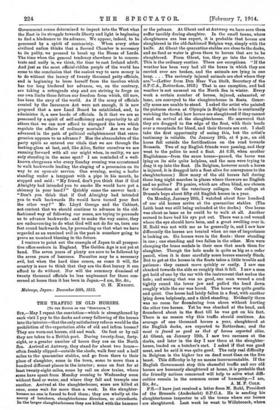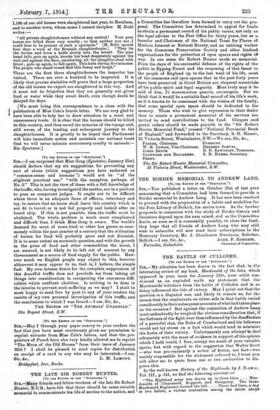THE TRAFFIC IN OLD HORSES,
LTO r>ts Emma 07 sac “Sewurrroa...] SIP.,—May I repeat the conviction—which is strengthened by each visit I pay to the docks and every following of the horses into the interior—that the only satisfactory reform would be the prohibition of the exportation alike of old and infirm horses P They are worn-out horses, old and weak. On foot or by rail they are taken to a British port. During twenty-four, forty- eight, or a greater number of hours they are on the North Sea. Arrived at Antwerp, they stand for about two hours— often freshly clipped—outside the sheds, walk four and a half miles to the quarantine stables, and go from there to their place of slaughter, some in the town, some to more than a hundred different places in the interior; some on foot for at least twenty-eight miles, some by rail on slow trains, where some have spent from Monday evening to Wednesday noon without food or water, and where they fall and trample one another. Arrived at the slaughterhouse, some are killed at once, some wait for more than a week. In the slaughter- houses no one is forced to feed them; they are wholly at the Mercy of butchers, slaughterhouse directors, or attendants. In the larger slaughterhouses they are killed with the hammer or the poleaxe. At Ghent and at Antwerp we have seen them suffer terribly during slaughter. In the small towns, where slaughterers are less expert, it is probable that horses are slaughtered in the old-fashioned Belgian way, simply with the knife. At Ghent the quarantine stables are close to the docks, and no food or water is given there to horses that are to be slaughtered. From Ghent, too, they go into the interior. This is the ordinary routine. There are exceptions. "If the weather has been very bad all the boxes in which they are carried over are broken, and the animals are lying in one heap. . . . The seriously injured animals are shot where they are."—(Letter from Den Heer Van Stolk, Secretary of the S.P.C.A., Rotterdam, 1913.) That is one exception, and bad weather is not unusual on the North Sea in winter. Every week a certain number of homes, injured, exhausted, or lame, are conveyed to the slaughterhouse in floats. Gener- ally some are unable to stand. I asked the artist who painted the pictures shown at Olympia (a Belgian who is continually watching the traffic) bow horses are slaughtered if they cannot stand on arrival at- the slaughterhouse. He answered that they are dragged to the edge of the float, with their heads over a receptacle for blood, and their throats are cut. I shall take the first opportunity of seeing this, but- the artist's testimony is reliable. On January 19th, at 6 p.m., an old home fell outside the fortifications on the road towards Brussels Two of my English friends were passing, and they went to the police to send a float. At 6.30, when another Englishman—from the same house—passed, the horse was lying on its side quite helpless, and the men were trying to drag it up into the float. (In Belgium, however much a horse is injured, it is dragged into a float alive for conveyance to the slaughterhouse.) How many of the old horses fall during those long night marches in places where there are no English. and no police P Pit ponies, which are often blind, are chosen for vivisection at the veterinary colleges. One college at Brussels buys about fifty old English horses in a year.
On Monday, January 26th, I watched about four hundred of our old horses arrive at the quarantine stables. (The Leith boat was still being unloaded at the docks.) One horse was about as lame as he could be to walk at all. Another seemed to have had his eye put out. There was a red wound where the eye should have been, and a great swelling over it. M. Rata was not with me as he generally is, and I saw how differently the horses are treated when no one of importance is looking on. Six horses were in the floats : three standing in one ; one standing and two fallen in the other. Men were clamping the brass medals in their ears that mark them for slaughter. Though the hole made is quite as big as a cedar pencil, when it is done carefully some homes scarcely flinch. But to get at the homes in the floats takes a little trouble and patience: they cannot move quickly or easily. I saw one chucked towards the side so roughly that it fell. I saw a man get hold of one by the ear with the instrument that makes the hole; and seeing that was no good, one man wound a cord tightly round the lower jaw and pulled the head down roughly while the ear was bored. The horse was quite gentle and quiet. One home had lately fallen in a float, with another lying down helplessly, and a third standing. Evidently there was no room for floundering iron shoes without hurting the other two horses. Yet he was chocked at the head, and floundered about in the float till be was got on his feet. There is no reason why this traffic should continue. An average of one thousand horses a year, slaughtered at the English docks, are exported to Rotterdam; and the meat is found as good as that of horses exported alive. At Ghent, on January 12th, I saw two carcases at the docks, and later in the day I saw them at the slaughter- house, loaded on a butcher's cart. I asked if that was good meat, and he said it was quite good. The only real difficulty in Belgium is the higher tax on dead meat than on the live beast. This difficulty is by no means insurmountable. If the English Government stop this shameful traffic and our old • horses are humanely slaughtered at home, it is probable that the friendly nations concerned will help to solve what diffi- culties remain in the common cause of humanity.—I am, P.S.—I have just received a letter from M. Ruhl, President of the Brussels (Anderleaht) S.P.C.A. He is sending his slaughterhouse inspector to all the towns where our homes are slaughtered. Last week he went to Willebreeek; where.
1,198 of our old horses were slaughtered last year, to Borsahem, and to another town, whose name I cannot decipher. M. Ruhl writes :—
"All private slaughterhouses without any control! Your poor horses are killed there very cruelly ; so that neither you nor I
could bear to be present at such a spectacle." Buhl spends four days a week at the Brussels slaughterhouse.] "They tie the horses and force a knife slowly into the breast. The poor beast falls, gets up again, knocks his head desperately against the wall and against the floor, smothering all the slaughter-shed with blood ; gets up again, to fall again. This lasts during five minutes. The people who stand round find this funny and laugh."
These are the first three slaughterhouses the inspector has visited. There are over a hundred to be inspected. It is . likely that precise statistics will prove that a large proportion of the old horses we export are slaughtered in this way. And it must not be forgotten that they are generally not given food or water while they await death, even though death be delayed for days.
[We must bring this correspondence to a close with the publication of Miss Cole's fourth letter. We are very glad to have been able to help her to draw attention to a cruel and unnecessary trade. It is clear that the horses should be killed in this country, and thus saved the miseries of thevoysge and, still worse, of the landing and subsequent journey to the slaughterhouses. It is greatly to be hoped that Parliament will take immediate action and maintain our national boast that Be will never tolerate unnecessary cruelty to animals.— ED. Spectator.]











































 Previous page
Previous page